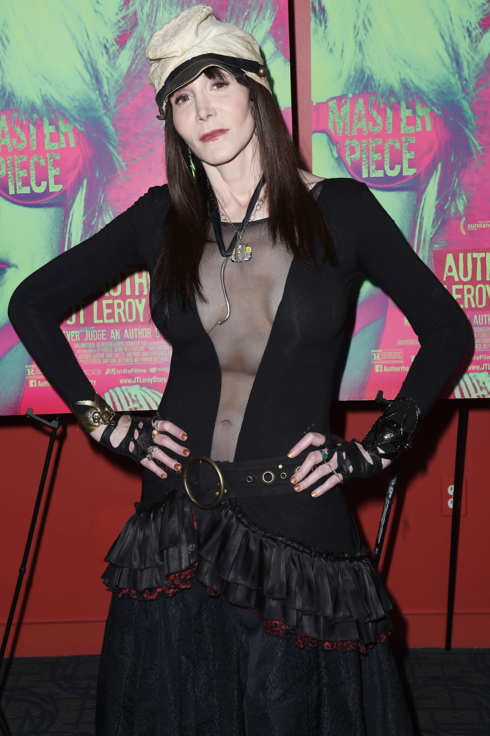 In 2005, JT Leroy died. Technically, of course, JT Leroy never existed. The transgender, HIV-positive, homeless child prostitute-turned-bestselling author was the fabrication of two San Francisco women whose machinations were exposed by journalists in 2005. But during the nine years that Jonathan “Terminator” Leroy “lived,” he presided as the little prince of U.S. literati and glitterati.
In 2005, JT Leroy died. Technically, of course, JT Leroy never existed. The transgender, HIV-positive, homeless child prostitute-turned-bestselling author was the fabrication of two San Francisco women whose machinations were exposed by journalists in 2005. But during the nine years that Jonathan “Terminator” Leroy “lived,” he presided as the little prince of U.S. literati and glitterati.
In last year’s excellent The Cult of JT Leroy, director Marjorie Sturm exposed the smoke and mirrors of this story, treating it as the country’s biggest hoax this side of War of the Worlds. As a San Francisco local who’d worked with mentally ill homeless people, Sturm had begun the documentary as an earnest homage. BUT upon the revelation that forty-year-old San Francisco resident Laura Albert and her twentysomething sister-in-law Savannah Koop had posed as Leroy (the former woman wrote his books and spoke as him on the phone; the latter posed as him in person), the filmmaker had whipped off her rose-colored glasses to give voice to the many who felt betrayed and manipulated.
Through her lens, Albert was Dr. Frankenstein, Savannah the Monster, and the artists, celebrities, and reading audiences duped by them both were innocent, injured parties–to a point. Hilariously, footage is resurrected of Winona Ryder bragging that she’d known Leroy for decades. (You can’t help flashing on her theft convictions from the same era.)
Unsurprisingly, Albert refused to participate in the project.
Now, Author: The JT Leroy Story has been released. Ostensibly by director Jeff Feuerzeig (The Devil and Daniel Johnston), it feels like another brainchild of Albert, who looms over it as if it were a big-screen podium; she even narrates in front of a blown-up printout of Leroy’s writings. Slickly crafted from found footage and a spidery animation, the documentary weaves between Leroy’s heyday and Albert’s dark early years in group homes and the Boston punk scene. A Brooklyn native from a broken home, she relocated as a young wife to 1990s San Francisco, where she first called a crisis hotline as troubled teenager “Terminator” (later called JT Leroy). The therapist on call swallowed the lie hook, line, and sinker, and encouraged the youth to work out his issues on the page. Thus begat the JT Leroy tomes Sarah, The Heart Is Deceitful Above All Things, and Harold.
Some may regard Author as the rope with which Albert can finally hang herself. Certainly it offers an unmitigated platform for her self-rationalization masquerading as self-narration. (The scant other voices here are those of A-list artists Courtney Love and Gus Van Sant, taped in super-creepy phone conversations with Albert-as-Leroy.) No one – not even Albert herself – disputes her psychological instability. But only Cult operates on the assumption she’s also a moral horror show.
Instead, Author dives reverently into JT’s origin story – how Albert birthed him and then shared him with the world. To be fair, it also unpacks how others bought so wholly into the mirage–even those, such as actress/director Asia Argento, who were physically intimate with Savannah/JT. 
Today, of course, a JT-style phenomenon could never happen. Cyber-stalking is so easy that he’d be cancelled before you could whisper “catfish.” It’s also hard to imagine an author being heralded as a bona-fide, red-carpet celeb in today’s cult of reality TV and social media stars. A ‘90s nostalgia colors any telling of the JT Leroy story–a wistfulness for that last moment when the literary world could colonize so much cultural landscape.
But there’s another angle here, one neither documentary addresses.
It’s the identity politics that allowed Leroy to come into focus – the question of whether the entity’s talent would so quickly have been embraced, then dismissed, had it been taken on its own merits.
Of course this question spawns another one–namely, how we define literary merits, and whether there exists an objective literary standard. Having briefly worked in the mostly white, affluent world of 90s publishing, I would say no. No matter what, it seems reasonable to hold a fortysomething MFA to different standards than we do a brutally marginalized adolescent.
But now that the books are largely out of print –-now that many seem embarrassed they upheld them in the first place–is it safe to assume the works weren’t being praised so much as the source? Or is the fickle and arbitrary nature of the publishing world the true reveal of JT Leroy?
My take? He’ll best be remembered for revealing the pyramids Americans build without foundations, and the pyramid schemes we substitute for care. To date, no one seems willing to topple them.
